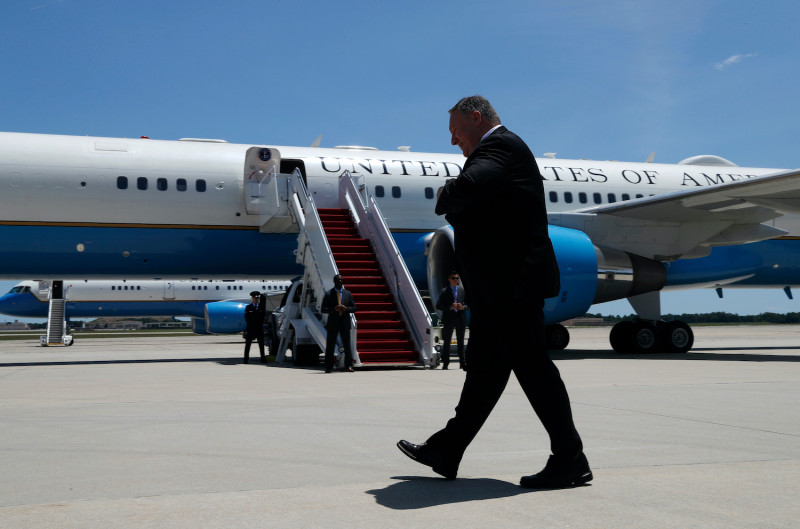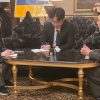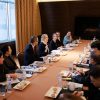Comment by Alyona Getmanchuk for Foreign Policy.

US Secretary of State Mike Pompeo walks by the media as he prepares to board a plane headed to Jeddah, Saudi Arabia at Andrews Air Force Base, near Washingtonon June 23, 2019. (Photo by Jacquelyn Martin / POOL / AFP) (Photo credit should read JACQUELYN MARTIN/AFP via Getty Images)
Hobbled by the impeachment trial, the U.S. secretary of state faces the tricky task of explaining a Trump administration policy that has often looked two-faced.
U.S. Secretary of State Mike Pompeo walks by the media as he prepares to board a plane at Andrews Air Force Base near Washington, D.C., on June 23, 2019. JACQUELYN MARTIN/AFP VIA GETTY IMAGES
Shadowed by an impeachment trial that has raised key questions about U.S. policy toward Ukraine, Secretary of State Mike Pompeo will travel to Kyiv on Thursday as part of a five-nation tour in which he faces the tricky task of explaining what often appears to be a two-faced Trump administration approach to Eastern Europe and Central Asia.
The rescheduled trip—which was originally set to take place after the New Year but was postponed due to tensions with Iran—will see Pompeo visit Ukraine, Belarus, Kazakhstan, and Uzbekistan after a stop in the United Kingdom. Pompeo’s agenda is said to focus on promoting human rights, energy independence, and economic reform throughout the former Soviet nations that he will visit in a part of the world that Moscow views as its backyard and that has often looked to the United States as a counterweight to its larger neighbors, including China. The Trump administration’s policy toward Russia and its neighbors across Eurasia has been criticized for its contradictory messages due to President Donald Trump’s conciliatory rhetoric toward Russia and its leader, Vladimir Putin, and his own government’s National Security Strategy that views Beijing and Moscow as Washington’s global rivals.
As Pompeo sets out on his Eurasian tour, the secretary of state will be looking to dispel any notions of a policy disconnect from the Trump administration for engaging with Russia and its neighbors—especially in the wake of an explosive interview with NPR in which he was quoted as saying: “Do you think Americans care about Ukraine?”
It could be a hard sell, according to several current and former U.S. officials. “This has been consistent: The president has one policy, Congress has another, the defense and intelligence community has another, and the State Department waxes and wanes on it,” said Heather Conley, a former State Department official and Europe expert at the Center for Strategic and International Studies.
While Trump has lavished praise on Putin—at times siding with him over Trump’s own intelligence community—his administration has taken a hard-line approach, ramping up defense spending for forces in Europe and expelling Russian diplomats as West-Russia ties worsen. Meanwhile, both the administration and Congress have blanketed Russia with crippling economic sanctions and fought tooth and nail to halt the construction of a key Russian pipeline project, Nord Stream 2, into Europe.
On Ukraine, the Trump administration greenlighted lethal weapons sales to Ukraine’s military—something the Obama administration balked at—even as the president himself cast doubt on whether supporting Ukraine was worth U.S. investments and withheld military aid from Ukraine, an issue at the heart of the impeachment trial.
On Belarus, the administration has engaged in a quiet and careful yearslong effort to normalize relations with a country that has been ruled by autocratic President Alexander Lukashenko for the last 25 years, pushing to normalize diplomatic ties and draw Minsk out from Russia’s orbit—but sent an unusual diplomatic slight by considering adding Belarus to the so-called “travel ban” list of countries facing U.S. visa restrictions.
Despite his administration’s hard-line policies on Russia, Trump can’t seem to escape the narrative that he is too cozy with Moscow, potentially making Pompeo’s job tougher.
“Because the Trump administration has been criticized for being too friendly with Russia, it’s important for [Pompeo] to show that there is a Eurasia policy, not simply a Russia policy,” said William Courtney, who served as U.S. ambassador to Georgia and Kazakhstan and is currently an adjunct senior fellow at the Rand Corp. “A key part of that is supporting reforms in Ukraine. It isn’t a model yet, but everyone in the region is watching if it can succeed. If it can, Ukraine could be the cradle of the former Soviet space.”
Holding a policy line and avoiding being sidelined by U.S. domestic politics during his diplomatic efforts may also prove tough for Pompeo as he sets foot in Ukraine, which is at the heart of Trump’s impeachment. Pompeo himself was pulled into the spotlight last week during a tense interview and ensuing confrontation with NPR’s Mary Louise Kelly about Ukraine and former ambassador Marie Yovanovitch, who was dismissed after Trump’s personal attorney, Rudy Giuliani, made unsubstantiated allegations against her. Following the NPR interview, Pompeo reportedly cursed at Kelly, challenged her to find the country on a map, and asked: “Do you think Americans care about Ukraine?”
“Expectations are quite modest from the Ukrainian side for [Pompeo]. The main hope is that this is about reaffirming support for Ukraine as America’s ally and not a reelection mission for Trump,” said Alyona Getmanchuk, the director of the New Europe Center, a think tank based in Kyiv.







